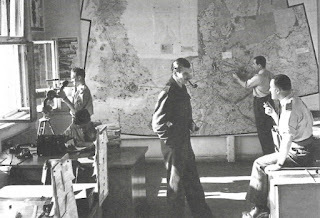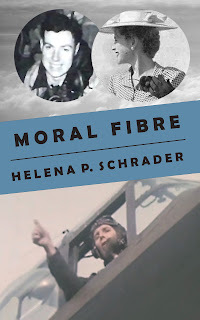BRIDGE TO TOMORROW: COLD PEACE - Meet Wing Commander Robert "Robin" Priestman
Cold Peace was designed to tell the story of the Berlin Airlift from a variety of perspectives. In consequence, no one character is dominant. Yet to the extent that there is a lead character, it is Wing Commander Robert "Robin" Priestman, the newly assigned RAF Station Commander at the only airfield in the British Sector of Berlin, Gatow. By the end of the Airlift, Gatow was the busiest airport in the world, with more average daily traffic than New York's La Guardia. But in November 1947 when Priestman receives his new assignment, it certainly didn't look that way and there was no reason to think the situation is about to change any time soon.
Excerpt 1:
Ofall the RAF airfields in the British Empire, why did he have to land in Berlin?The word conjured up Hitler’s voice and the unique way he harangued andthreatened. It brought back the sound of unsynchronised engines groaning acrossthe sky, the jangling of the telephone, the squawking of the tannoy, the sirensand the crump of bombs. He had only to look around to see the scars left bythose bombers. London had “taken it,” but at a high price. Gaps like brokenteeth marred every row of buildings as far as he could see.
Moreinsidious, however, was the association of “Berlin” with the Gestapo — theominous threat over seventeen months in captivity during which the Luftwaffeguards hinted that they would have been more comradely, more compassionate,more generous, if only “Berlin” weren’t looking over their shoulders, if only“Berlin” didn’t threaten to kill all the prisoners, if only “Berlin” with itstorture chambers did not await the rebellious and the runaway….
Yetsuch feelings were irrational, Priestman reminded himself. That Berlin had been obliterated, crushed, eradicated.Hitler was dead, his minions were arrested, tried, and hanged. The Gestapo didnot exist anymore. The victorious Allies controlled Berlin, and their jointoccupation forces patrolled the streets and the skies, a constant reminder ofGermany’s utter defeat and unconditionalsurrender. Why on earth should he dread an assignment to Berlin so viscerally?
Wasit just the fact that he was being grounded again? He’d been counting on aposting where he could fly. He was a good pilot and he liked leading in theair. The best assignments of his career had been commanding a Hurricanesquadron during the Battle of Britain and then the Kenley Wing later in thewar. There were no positions like that in peacetime, of course, but there werestill flying jobs to be had. Maybe,if the RAF was unwilling to let him fly, he should throw in the towel and tryto get employment in civil aviation. Except that he was a fighter pilot, anerstwhile aerobatics pilot, and he didn’t have the qualifications on heavy,multi-engine aircraft that the airlines wanted. Not to mention that there weretens of thousands of ex-RAF pilots from Bomber, Transport and Coastal Commands,who did have those qualifications. There was no point inchasing fantasies. He was not going to get a flying job anywhere in the UK.
Someof his former colleagues had found work with the air forces in the colonies —South Africa, Kenya, India, Burma, Malaya. Sometimes memories of Singaporehaunted him with alluring images of the tropics and sailing on the South ChinaSea. But he had no friends or relatives in influential positions in thosedistant places. What was he supposed to do? Spend his last shilling to go tothe ends of the earth and then — find nothing? Even if he hadn’t been married,he would not have risked it.
To readers familiar with Where Eagles Never Flew, Robin Priestman is no stranger. In the earlier novel, which describes the Battle of Britain, Robin is shot-down and wounded fighting in France and then serves as an instructor at an Operational Training Unit before being entrusted with command of a front-line squadron facing the Germans in the late summer of 1940. Cold Peace picks up his story two-and-a-half years after the end of the war, or seven years after the close of Where Eagles Never Flew. In the meantime, Robin has gone to staff college, served on Malta, commanded a fighter wing, and spent almost 18 months in a German POW camp. Since the end of the war, he has flown only a desk -- a "mahagony Spitfire" as they sometimes called it -- in a staff job in London.
All that has not left him unchanged. Particularly his time as a POW has left scars -- not the least of which is an intense dislike of Germans. The thought of being sent to Germany in a position where he will be expected to be nice to Germans does not exactly please him. But his options are very limited. Britain is in debt. The Labour government is cutting back on the military. Jobs are scarce and officers who say "no" to assignments unwanted. So Robin is off to the former Luftwaffe training airfield Gatow, which has the reputation of being a sleepy backwater of no particular importance to anyone.
Robin's initial problem is that he doesn't really have a clue what the RAF is doing there. The Germans are docile, so there's no need for the occupation forces to use military means to keep them in line. The Russians on the other hand have a 100:1 superiority in fighter aircraft in theater -- which makes Robin's lone Spitfire squadron useless in a fight with the Russians. It is only as the Soviets gradually tighten the screws that Robin comes to understand his role -- and how vital it is for the future of Europe.
Excerpt 2:
With his courtesy calls on the British Commandant andAir Commodore Waite scheduled for the afternoon, Priestman had a few hours toprepare. Given that he’d seen nothing whatsoever of Berlin, he asked SquadronLeader “Danny”Daniels, commander of the lone Spitfire squadron stationed at Gatow, togive him an aerial tour of Berlin.
Priestmanhad a secondary motive for this request: he wanted to fly a Spitfire again. Thelast time he’d been at the controls of a Spit, he’d been bested in a dogfightand ended up a prisoner of war for seventeen months. On his return frominternment, he’d requalified as a pilot at an RAF Operational Training Unit,but it had been outfitted with Typhoons and Mustangs. Since then, his onlyflying had been weekend flips on an Anson at Northolt to retain his flyingstatus. He knew he had to erase that last flight into humiliation and captivitywith a successful flight on a Spitfire. It wasn’t that he expected majorproblems, but he wanted to get this encounter over with as soon as possible sohe’d be free to move on.
Priestmanpulled his Irving flying jacket over his uniform and swapped his shoes forflying boots in his office, then with his gloves stuffed in the pockets, hecrossed over to the squadron dispersal hut, where Danny awaited him. TheSquadron Leader indicated two Spitfires that had already been checked andfuelled by the ground crew.
Asthey walked side-by-side toward the aircraft, Danny remarked. “I can’t tell youwhat a pleasure it is to have you here, sir. I know the chaps would like achance to talk to you in more depth, and I was wondering if you could find thetime to talk to the squadron one of these days.”
“Aboutwhat?” Priestman asked warily. He had spent years trying to shake off thereputation of an irresponsible aerobatics pilot and playboy. That image hadbeen replaced by “Battle of Britain ace.” Proud as he was to have taken anactive part in the defence of the realm in 1940, that had been almost eightyears ago. He was now thirty-two and he didn’t want his greatest glory to bewhat he’d done at twenty-four. He wanted to have a meaningful future, not justa glorious past.
“Oh,just your wartime experiences, sir,” Danny confirmed his fears and Priestmanwas on the brink of declining when he added, “You won’t remember me, but Ibriefly served in your wing before you were shot down over France.”
Irritationwas instantly replaced with mortification. Priestman had not recognized theSquadron Leader and apologised at once. “I’m sorry, Danny. I didn’t recogniseyou.”
“Noreason why you should, sir. I was straight out of flight school and a pilotofficer in 148 Squadron, sir. The sweep on which you were lost would have beenmy third operational sortie, but my oxygen went u/s and I had to abort.”
“Justas well. We ran into what felt like the whole bloody Luftwaffe — or anyway, allthe FW190s they had.” Priestman had seen at least two other Spitfires flame outin the dogfight that had taken him out of the war.
“Yes,I was a bit shaken when four of you didn’t return, and the others were badlyshocked that you were one of the missing. Although I missed the op, I took partin the efforts to find you.”
Priestmanlooked at him blankly.
“Weflew three different sweeps to find your Spitfire and try to determine if therewas any chance you’d survived the crash. No one remembered seeing anyparachute, you see.”
“I’mhonoured. I didn’t know that. I hope no one was lost trying to find me.”
Therewas just a hint of hesitation before Danny answered, “Not that I can remember,sir.” Priestman concluded that either Danny really couldn’t remember, or elsesomeone had been killed and the Squadron Leader kindly chose not to tell him.
Cold Peace is Book I of the Bridge to Tomorrow Series.
Three years after WWII, Europe struggles with rationing, widespread unemployment and a growing Soviet threat. Hitler's former capital lies ruined under the joint control of wartime allies bitterly at odds. With the currency worthless, the population lives on hand-outs or turns to crime and prostitution. Deep inside the Soviet Zone of occupation, Berlin appears to be an ideal target for a communist take-over, putting the defenders of democracy on a collision course with Stalin's merciless aggression.
A Battle of Britain ace, a female air traffic controller, a concentration camp survivor and an ex-ATA woman pilot are just some of those trying to find their place in the post-war world. An air ambulance service offers a shimmer of hope, but when a Soviet fighter brings down a British passenger liner, Berlin becomes a flashpoint. The world stands poised on the brink of World War Three.
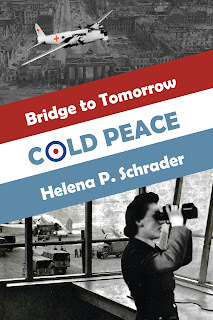
Find out more at: https://www.helenapschrader.com/bridg...
Previous releases include:
" MORAL FIBRE," which WON THE HEMINGWAY AWARD 2022 FOR 20TH CENTURY WARTIME FICTION and a MAINCREST MEDIA AWARD FOR MILITARY FICTION as well as being A FINALIST FOR THE BOOK EXCELLENCE AWARD 2023 IN THE CATEGORY HISTORICAL FICTION.
Riding the icy, moonlit sky,they took the war to Hitler.
Their chances of survival were less than fifty percent.
Their average age was 21.
This is the story of just one bomber pilot, his crew and the woman he loved.
It is intended as a tribute to them all.
or Barnes and Noble.
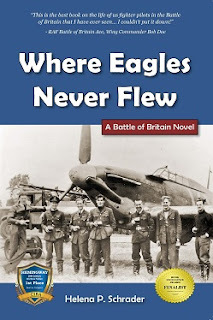 "This is the best book on the life of us fighter pilots in the Battle of Britain that I have ever seen.... I couldn't put it down."-- RAF Battle of Britain ace, Wing Commander Bob Doe.
"This is the best book on the life of us fighter pilots in the Battle of Britain that I have ever seen.... I couldn't put it down."-- RAF Battle of Britain ace, Wing Commander Bob Doe.
Winner of a Hemingway Award for 20th Century Wartime Fiction, a Maincrest Media Award for Military Fiction and Silver in the Global Book Awards.
Find out more at: https://crossseaspress.com/where-eagles-never-flew
For more information about all my books visit: https://www.helenapschrader.com
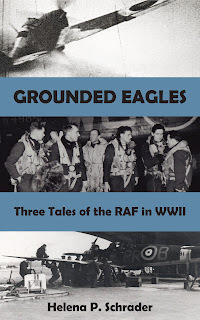 Disfiguring injuries, class prejudice and PTSD are the focus of three tales set in WWII by award-winning novelist Helena P. Schrader. Find out more at: https://crossseaspress.com/grounded-eagles
Disfiguring injuries, class prejudice and PTSD are the focus of three tales set in WWII by award-winning novelist Helena P. Schrader. Find out more at: https://crossseaspress.com/grounded-eagles

